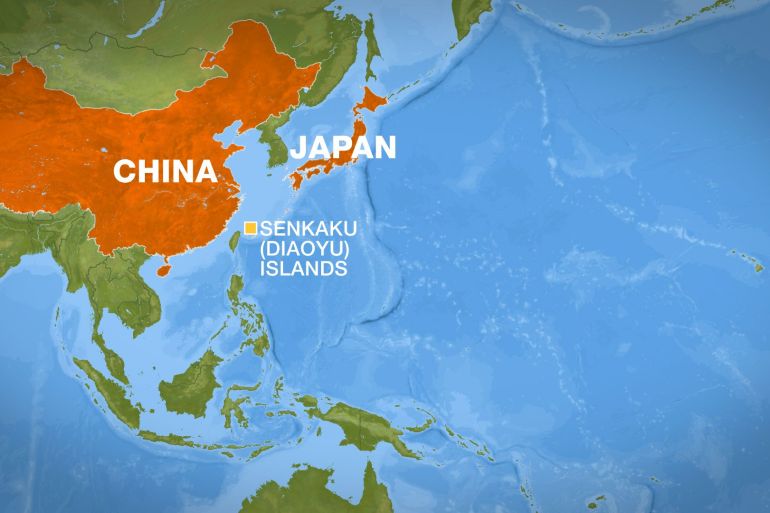Japan deports pro-China island activists
Crowds in Hong Kong applaud arriving activists who carried banner reading “Successful landing on Diaoyu islands”.

Japan has deported 14 pro-China activists who were detained after landing on a disputed island in the East China Sea.
Five activists and two Chinese television journalists, who flew to Hong Kong on Friday from Okinawa, arrived to a hero’s welcome, while the rest of the activists were taken to their boat in the Japanese port of Ishigaki.
China and Japan have been at odds since the activists were detained on Wednesday after travelling to the rocky, uninhabited isles known as the Senkaku in Japan and the Diaoyu in China.
Earlier on Friday, Japan’s top government spokesman had told reporters that the prime minister had approved the deportations.
“This is not something the government has decided on emotionally. We firmly and strictly responded in accordance with our domestic law,” said Chief Cabinet Secretary Osamu Fujimura at a news conference.
Prime Minister Yoshihito Noda, who had been under pressure to act on an issue that is keenly felt in Beijing and who has also been dealing with a territorial spat with South Korea, called a special cabinet meeting on Friday.
“It is really regrettable that they entered Japan’s territorial waters and illegally landed on Uotsurijima, despite our repeated warnings,” he told his ministers, referring to the archipelago’s main island.
‘Successful landing’
At Hong Kong’s international airport, crowds of Chinese passengers clapped their arrival, as the men waved red China flags and carried a banner saying: “Successful landing on Diaoyu islands. Activists show their ambition.”
Amid emotional scenes, the men again asserted China’s sovereignty over the islands and denounced Japan’s actions as illegal.
“The Diaoyus are a part of China,” said activist Tsang Kin-shing to a massive throng of reporters at the arrivals gate.
China’s official Xinhua news agency said in a commentary: “This time, the Japanese government has quickly released the illegally detained Chinese Diaoyu people, a wise move to avoid the deterioration in Sino-Japan relations.
“But how to prevent the tension over the Diaoyu islands from escalating, and how to avoid further harming Sino-Japanese relations, the Japanese government’s next step is crucial, while respecting the historical facts and the feelings of the Chinese people, [the Japanese government] must end as soon as possible the absurd ‘buying islands’ farce.”
The nationalist governor of Tokyo, Shintaro Ishihara, has proposed that the Tokyo Metropolitan Government buy the islands from their private owners. The prime minister wants to have the central government make the purchase instead.
Ishihara criticised Noda’s decision to deport the activists.
“It is a distinct criminal case,” Ishihara told reporters in Tokyo. “We can’t call Japan a real law-governed country if it sends them back as mere illegal aliens.”
Islands row
In a widening of the territorial dispute, Japanese Finance Minister Jun Azumi postponed a trip to South Korea for a meeting with his counterpart scheduled for August 24 because of a trip made by South Korean President Lee Myung-bak to other disputed islands a week ago.
Japan will also review a bilateral currency swap agreement struck with South Korea last year, Azumi said, suggesting that Tokyo could consider cancelling the deal before it expires in October.
Japan occupied much of China during the war and colonised the Korean peninsula, the source of several feuds dogging relations with its neighbours nearly seven decades after the end of World War II.
Beijing had demanded the immediate release of the Chinese activists after they reached the islands, which lie near potentially rich gas reserves.
Tokyo’s move to free them after questioning is seen as an attempt to cool things down given close economic ties that link Japan and China despite their troubled history and contemporary rivalry over resources and regional clout.
Beijing resident Chen Qiyuan told Reuters he thought Japan’s reaction showed China’s tough stance was paying off.
“I think that the Japanese are exercising restraint for fear [of the consequences], and are trying not to blow up the issue.”
In 2010, tension flared after Japan seized a Chinese fishing trawler in the same waters after it collided with a Japanese patrol boat. Its captain was detained for more than two weeks.
Japan’s relations with South Korea also worsened after President Lee’s August 10 visit to other islands believed to contain frozen natural gas deposits potentially worth billions of dollars.
The renewed maritime tension with China has echoed China’s recent tangles with Southeast Asian countries over rival territorial claims in the South China Sea.
China’s expanding naval reach has fed worries that it could brandish its military might to get its way.